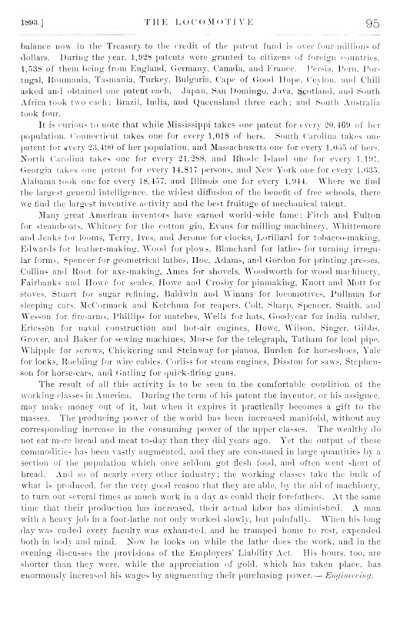The Locomotive - Lighthouse Survival Blog
The Locomotive - Lighthouse Survival Blog
The Locomotive - Lighthouse Survival Blog
You also want an ePaper? Increase the reach of your titles
YUMPU automatically turns print PDFs into web optimized ePapers that Google loves.
1893.J TUE LOCOMOTIVE 95<br />
balance now in the Treasury to the credit of the patent fund is over four uiillions of<br />
dollars. Duriug the year, 1,928 patents were granted to citizens of foreign countries,<br />
1,538 of them being from England, Germany, Canada, and France. Persia, Peru, Por-<br />
tugal, Rouniiuiia, Tasmauia, Turkey, Bulgaria, Cape of Good Hope, Ceylon, and Chili<br />
asked and obtained one patent each. Japan, San Domingo, Java, ^otlaud, and South<br />
Africa took two each; Brazil, India, and Queensland three each; and South Australia<br />
took four.<br />
It is curious to note that while Mississippi takes one patent for every 20,469 of her<br />
population. Connecticut takes one for every 1,018 of hers. South Carolina takes one<br />
patent for «very 2;i.4JlO of her population, and Massachusetts one for every 1,0.35 of hers.<br />
Nortii Carolina takes one for every 21,288, and Rhode Island one for every 1,191.<br />
Georgia takes one patent for every 14,817 persons, and New York one for every 1,035.<br />
Alabama took one for every 18,457, and Illinois one for every 1,944. Where we find<br />
the largest general intelligence, the widest diffusion of the benefit of free schools, there<br />
we find the largest inventive activity and the best fruitage of mechanical talent.<br />
Many great American inventors have earned world-wide fame: Fitch and Fulton<br />
for steamboats, Wliitney for the cotton gin, Evans for milling machinery, "Whittemore<br />
and Jenks for looms, Terry, Ives, and Jerome for clocks, Lorillard for toljacco-making,<br />
Edwards for leather-making, "Wood for plows, Blanchard for lathes for turning irregu-<br />
lar forms, Spencer for geometrical lathes, Hoe, Adams, and Gordon for printing presses,<br />
Collins and Root for axe-making, Ames for shovels, "Woodworth for wood machinery,<br />
Fairbanks and Howe for scales, Howe and Crosby for pinmaking, Knott and Mott for<br />
stoves, Stuart for sugar refining, Baldwin and "Winans for locomotives, Pullman for<br />
sleeping cars, McCormack and Ketchum for reapers, Colt, Sharp, Spencer, Smith, and<br />
Wesson for fire-arms, Phillips for matches, Wells for hats, Goodyear for india rubber,<br />
Ericsson for naval construction and hot-air engines, Howe, Wilson, Singer, Gibbs,<br />
Grover, and Baker for sewing machines, 3Iorse for the telegraph, Tatham for lead pipe,<br />
Whipple for screws, Chickering and Steinway for pianos. Burden for horseshoes, Yale<br />
for locks, Roebling for w ire cables, Corliss for steam engines, Disston for saws, Stephen-<br />
son for horse-cars, and Gatling for quick-firing guns.<br />
<strong>The</strong> result of all this activity is to be seen in the comfortable condition of the<br />
working classes in America. During the term of his patent the inventor, or his assignee,<br />
may make money out of it, but when it expires it practically becomes a gift to the<br />
masses. <strong>The</strong> producing power of the world has been increased manifold, without any<br />
corresponding increase in the consuming power of the upper classes. <strong>The</strong> wealthy do<br />
not eat more bread and meat to-day than they did years ago. Y'et the output of these<br />
commodities has been vastly augmented, and they are consumed in large quantities by a<br />
section of the population which once seldom got flesh food, and often went short of<br />
bread. And so of nearly every other industry; the working classes take the bulk of<br />
what is produced, for the very good reason that they are able, by the aid of machinery,<br />
to turn out several times as much work in a day as could their forefathers. At the same<br />
time that their production has increased, their actual labor has diminished. A man<br />
-with a heavy job in a foot-lathe not only worked slowly, but painfully. When his long<br />
day was ended every faculty svas exhausted, and he tramped home to rest, expended<br />
both in body and mind. Now he looks on while tiie lathe does the work, and in the<br />
evening discusses the provisions of the Employers' Liability Act. His hours, too, are<br />
shorter than they were, while the appreciation of gold, which has taken place, has<br />
enormously increased his wages by augmenting their purchasing power.— Engineering.
















